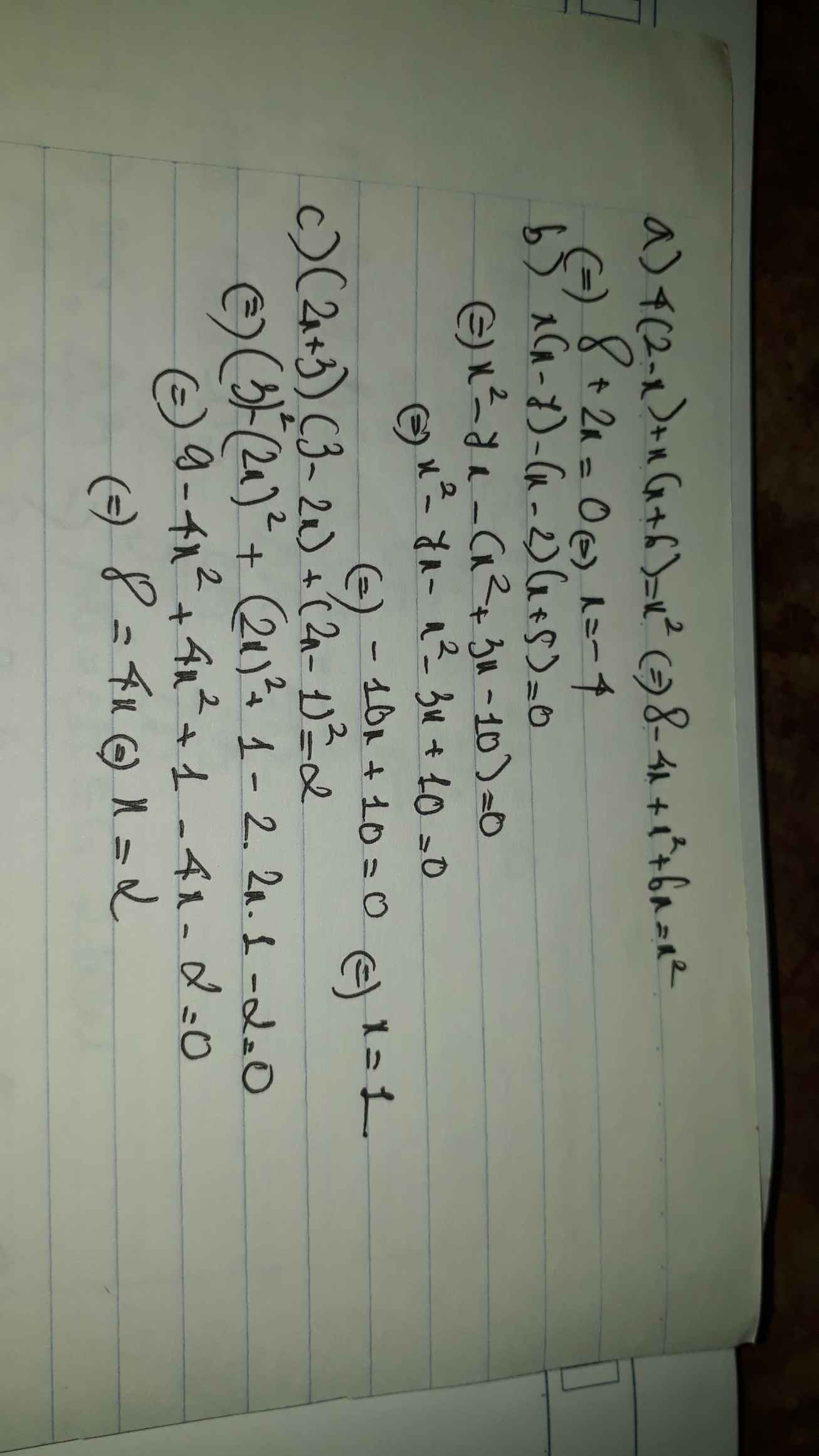
Hãy nhập câu hỏi của bạn vào đây, nếu là tài khoản VIP, bạn sẽ được ưu tiên trả lời.


`a,x(x-1)-(x+2)^2=1`
`<=>x^2-x-x^2-4x-4=1`
`<=>-5x=5`
`<=>x=-1`
`b,(x+5)(x-3)-(x-2)^2=-1`
`<=>x^2+2x-15-x^2+4x-4+1=0`
`<=>6x-18=0`
`<=>x-3=0`
`<=>x=3`
`c,x(2x-4)-(x-2)(2x+3)=0`
`<=>2x(x-2)-(x-2)(2x+3)=0`
`<=>(x-2)(2x-2x-3)=0`
`<=>-3(x-2)=0`
`<=>x-2=0`
`<=>x=2`
`d,x(3x+2)+(x+1)^2-(2x-5)(2x+5)=-12`
`<=>3x^2+2x+x^2+2x+1-4x^2+25=-12`
`<=>4x+26=-12`
`<=>4x=-38`
`<=>x=-19/2`

a: Ta có: \(4\left(2-x\right)+x\left(x+6\right)=x^2\)
\(\Leftrightarrow8-4x+x^2+6x-x^2=0\)
\(\Leftrightarrow2x=-8\)
hay x=-4
b: Ta có: \(x\left(x-7\right)-\left(x-2\right)\left(x+5\right)=0\)
\(\Leftrightarrow x^2-7x-x^2-3x+10=0\)
\(\Leftrightarrow-10x=-10\)
hay x=1
c: Ta có: \(\left(2x+3\right)\left(3-2x\right)+\left(2x-1\right)^2=2\)
\(\Leftrightarrow9-4x^2+4x^2-4x+1=2\)
\(\Leftrightarrow-4x=-8\)
hay x=2

\(a,\left(2x+1\right)^2-4\left(x+2\right)^2=9\\ \Leftrightarrow4x^2+4x+1-4\left(x^2+4x+4\right)-9=0\\ \Leftrightarrow4x^2-4x^2+4x-16x+1-16-9=0\\ \Leftrightarrow-12x=24\\ \Leftrightarrow x=\dfrac{24}{-12}=-2\\ b,\left(x+3\right)^2-\left(x-4\right)\left(x+8\right)=1\\ \Leftrightarrow x^2+6x+9-\left(x^2+4x-32\right)=1\\ \Leftrightarrow x^2-x^2+6x-4x=1-9-32\\ \Leftrightarrow2x=-40\\ \Leftrightarrow x=-20\\ c,3\left(x+2\right)^2+\left(2x-1\right)^2-7\left(x+3\right)\left(x-3\right)=36\\ \Leftrightarrow3\left(x^2+4x+4\right)+\left(4x^2-4x+1\right)-7\left(x^2-9\right)=36\\ \Leftrightarrow3x^2+12x+12+4x^2-4x+1-7x^2+63=36\\ \Leftrightarrow3x^2+4x^2-7x^2+12x-4x=36-12-1-63\\ \Leftrightarrow8x=-40\\ \Leftrightarrow x=\dfrac{-40}{8}=-5\)

a, <=> x2 -2x +1 + 5x -x2 =8
<=> 3x +1 =8
<=> 3x = 7
<=> x= 7/3
b, thiếu đề
c, <=> 2x3 -1 + 2x(4 -x2) = 7
<=> 2x3 + 8x -23 = 8
<=> 8x =8
<=> x=1

a: Ta có: \(\left(x-5\right)\left(x+3\right)=x\left(x-3\right)\)
\(\Leftrightarrow x^2-2x-15-x^2+3x=0\)
\(\Leftrightarrow x=15\)
b: Ta có: \(\left(x+2\right)^2=\left(x-1\right)\left(x+2\right)\)
\(\Leftrightarrow x+2=0\)
hay x=-2
c: Ta có: \(\left(x-6\right)\left(x+6\right)=x^2\)
\(\Leftrightarrow x^2-36=x^2\)(vô lý)
a. (x - 5)(x + 3) = x(x - 3)
<=> x2 + 3x - 5x - 15 = x2 - 3x
<=> x2 - x2 + 3x - 5x + 3x - 15 = 0
<=> x = 15
b. (x + 2)2 = (x - 1)(x + 2)
<=> x2 + 4x + 4 = x2 + 2x - x - 2
<=> x2 - x2 + 4x - 2x + x = -2 - 4
<=> 3x = -5
<=> \(x=\dfrac{-5}{3}\)
c. (x - 6)(x + 6) = x2
<=> x2 - 36 - x2 = 0
<=> x2 - x2 = 36
<=> 0 = 36 (vô lí)
Vậy nghiệm của PT là \(S=\varnothing\)
d. (2x - 3)2 = 4x2 - 8
<=> 4x2 - 12x + 9 - 4x2 + 8 = 0
<=> 4x2 - 4x2 - 12x = -8 - 9
<=> -12x = -17
<=> \(x=\dfrac{17}{12}\)

a) Ta có: \(\left(2x-1\right)\left(x^2-x+1\right)=2x^3-3x^2+2\)
\(\Leftrightarrow2x^3-2x^2+2x-x^2+x-1-2x^3+3x^2-2=0\)
\(\Leftrightarrow3x=3\)
hay x=1
Vậy: S={1}
b) Ta có: \(\left(x+1\right)\left(x^2+2x+4\right)-x^3-3x^2+16=0\)
\(\Leftrightarrow x^3+2x^2+4x+x^2+2x+4-x^3-3x^2+16=0\)
\(\Leftrightarrow6x=-20\)
hay \(x=-\dfrac{10}{3}\)
c) Ta có: \(\left(x+1\right)\cdot\left(x+2\right)\left(x+5\right)-x^3-8x^2=27\)
\(\Leftrightarrow\left(x^2+3x+2\right)\left(x+5\right)-x^3-8x^2-27=0\)
\(\Leftrightarrow x^3+5x^2+3x^2+15x+2x+10-x^3-8x^2-27=0\)
\(\Leftrightarrow17x=17\)
hay x=1

b) Ta có: \(\dfrac{x-2}{4}=\dfrac{2x+1}{3}\)
\(\Leftrightarrow3\left(x-2\right)=4\left(2x+1\right)\)
\(\Leftrightarrow3x-6=8x+4\)
\(\Leftrightarrow3x-8x=4+6\)
\(\Leftrightarrow-5x=10\)
hay x=-2
Vậy: x=-2

\(a,\left(x+2\right)^2+\left(x+3\right)^2-2\left(x-2\right)\left(x-3\right)=19\\ \Leftrightarrow x^2+4x+4+x^2+6x+9-2x^2+10x-12=19\\ \Leftrightarrow20x=20\\ \Leftrightarrow x=1\\ b,\left(x+2\right)\left(x^2-2x+4\right)-x\left(x^2-5\right)=15\\ \Leftrightarrow x^3+8-x^3+5x=15\\ \Leftrightarrow5x=7\\ \Leftrightarrow x=\dfrac{7}{5}\\ c,\left(x-1\right)^3+\left(2-x\right)\left(4+2x+x^2\right)+3x\left(x+2\right)=17\\ \Leftrightarrow x^3-3x^2+3x+1+8-x^3+3x^2+6x=17\\ \Leftrightarrow9x=8\\ \Leftrightarrow x=\dfrac{8}{9}\)
a. (x + 2)2 + (x + 3)2 - 2(x - 2)(x - 3) = 19
<=> (x2 + 4x + 4) + (x2 + 6x + 9) - (2x + 4)(x - 3) = 19
<=> x2 + 4x + 4 + x2 + 6x + 9 - 2x2 + 6x - 4x + 12 = 19
<=> x2 + x2 - 2x2 + 4x + 6x + 6x - 4x + 9 + 4 + 12 - 19 = 0
<=> 12x + 6 = 0
<=> 6(2x + 1) = 0
<=> 2x + 1 = 0
<=> 2x = -1
<=> x = \(\dfrac{-1}{2}\)

a, \(\left(x+3\right)^2-\left(x-4\right)\left(x+8\right)=1\)
\(\Leftrightarrow x^2+6x+9-x^2-4x+32=1\)
\(\Leftrightarrow2x+41=1\Leftrightarrow2x+40=0\Leftrightarrow x=-20\)
b, \(3\left(x+2\right)^2+\left(2x-1\right)^2-7\left(x-3\right)\left(x+3\right)=36\)
\(\Leftrightarrow3\left(x^2+4x+4\right)+4x^2-4x+1-7\left(x^2-9\right)=36\)
\(\Leftrightarrow3x^2+12x+12+4x^2-4x+1-7x^2+63=36\)
\(\Leftrightarrow8x+40=0\Leftrightarrow x=-5\)
( x + 3 )2 - ( x - 4 )( x + 8 ) = 1
<=> x2 + 6x + 9 - ( x2 + 4x - 32 ) - 1 = 0
<=> x2 + 6x - x2 - 4x + 32 + 8 = 0
<=> 2x + 40 = 0 <=> x = -20